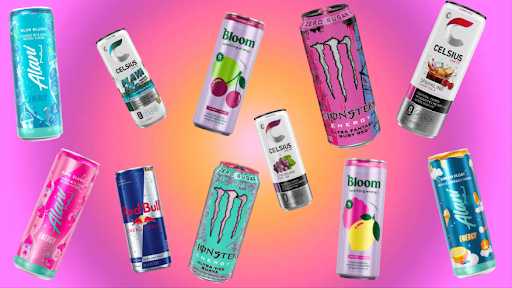Energy drinks are very popular with high school students. They provide caffeine, which helps students stay awake and remain more focused when in school or work. But, is this really true? Or is it all just a mental game?
Most energy drinks have around 50 to 300 mg of caffeine. The more caffeine you drink, the faster your heart rate gets. While students have more energy and a longer attention span, these are definitely not good for your heart.
According to the CDC (Center for Disease Control and Prevention), in 2011, 1,499 teens who are 12–17 years old, were sent to the E.R. because of energy drink related health issues.
Energy drinks can cause insomnia, anxiety, dehydration, and heart complications. Teenagers, especially when still developing, should not be putting this much caffeine in their systems a day. However, some students feel otherwise.
Lizzy Hill, sophomore, said, “I feel like a lot of people drink them to look cool. They don’t realize the health issues that come in that little can.”
Energy drinks are seen as “cool.” Many students like to carry their drinks around school even if they are empty. There are many influencers on social media who drink them so students feel inclined to do the same.
After drinking energy drinks, people feel energized and focused. But how much of that is a mental game and how much is reality?
According to Harvard Health Publishing, the placebo effect could be a major component to the hype around energy drinks. The placebo effect is when someone feels physical or mental change, even when nothing is happening.
For students, this would be energy drinks. They might have no real effect but make us think they do.
Andrew Waters, senior, said, “I like the brand, Monster. I don’t think that they work like crazy, but they do a little bit. I like to drink them before work, the gym, and school.”
Whether they work or not, students still see benefits. For all of the activities one has to complete in an average day, energy is essential. This is why many students reach for the energy drink before doing anything, relying on that to make it through the day.
Energy drinks may be making students too reliant, leading them to sleep more frequently and lose focus when one isn’t available.
Max Farznanegan, junior, said, “I drink 1 or 2 a day. I just feel like I need it. I know they aren’t good for me but that’s a problem for another day.”
While some students don’t see the negative effects yet, if they keep up the consumption, they will see it in the near future. This could create many problems such as other addictions, heart failure, anxiety, and dehydration.
When drinking energy drinks, students forget to drink water as well. The average daily water consumption should be half of your body weight in ounces. When there is an energy drink in replacement of water, that amount rapidly decreases.
Energy drinks often make people feel jittery, as if they can’t stop shaking. This is because the amount of caffeine over stimulates the nervous system.
Kaylee Robbins, freshman, said, “If there was a drink that tasted the same but had no caffeine, I would rather drink that, because the caffeine doesn’t even do anything.”
Obviously there are some better options for drinks without caffeine but they just don’t taste the same. Since the caffeine adds no real taste to the drink, why can’t companies make a caffeine free version of the drinks? Well, some do.
Celsius, Bang Energy, and Monster all make caffeine free versions of their popular energy drinks and students can’t tell the difference. If these other companies make more caffeine free drinks, they might just be more popular than they were before.

Leave a Reply